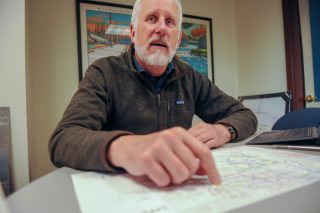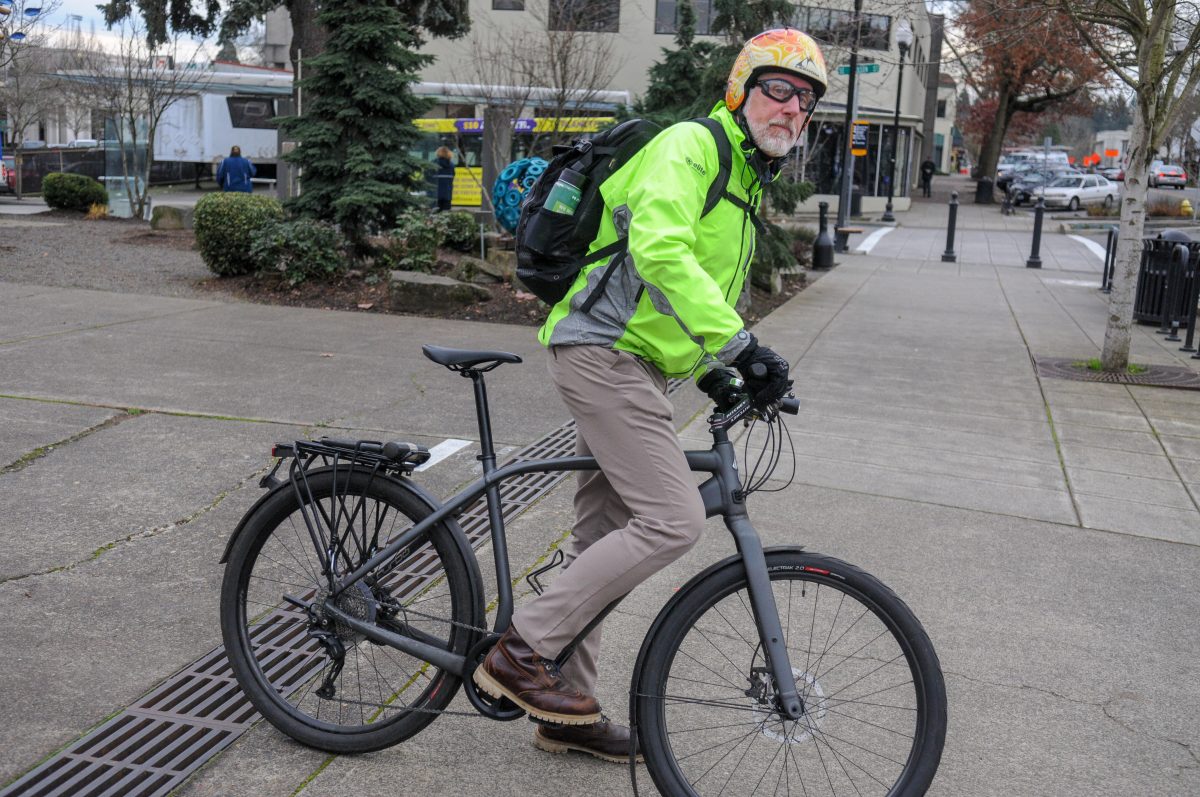
(Photos: Jonathan Maus/BikePortland)
Surprisingly, the loudest political voice for bicycling in our region doesn’t come from Portland City Hall. It comes from a city hall six miles south of Portland in Milwaukie, in the office of Mayor Mark Gamba.
One reason Gamba has emerged as a leader on transportation reform is that he probably logs more miles on a bicycle than all other regional elected officials combined (and yes, it matters). In the past few years I’ve noticed Gamba and his sleek, matte black, Specialized Vado e-bike at meetings and events that are often more than a dozen miles from his office. The other reason cycling is front and center for Mayor Gamba is because it ticks all the boxes when it comes to his highest policy priority: climate change. A former National Geographic photographer, Gamba told me during an interview last month that observing wildlife through his camera lens has given him the urgency to save it.
Gamba is the rare Oregon politician who isn’t afraid of the word “bike”. In fact, he embraces it.
During my time with Gamba we talked about his focus on climate change, his work to make Milwaukie a nicer place to walk and bike, his push for transportation reform across the region — and the politics it takes to make it happen. And of course, we got out on our bikes for a ride around town.
My conversation with Mayor Gamba is below. It’s been edited for brevity and readability…
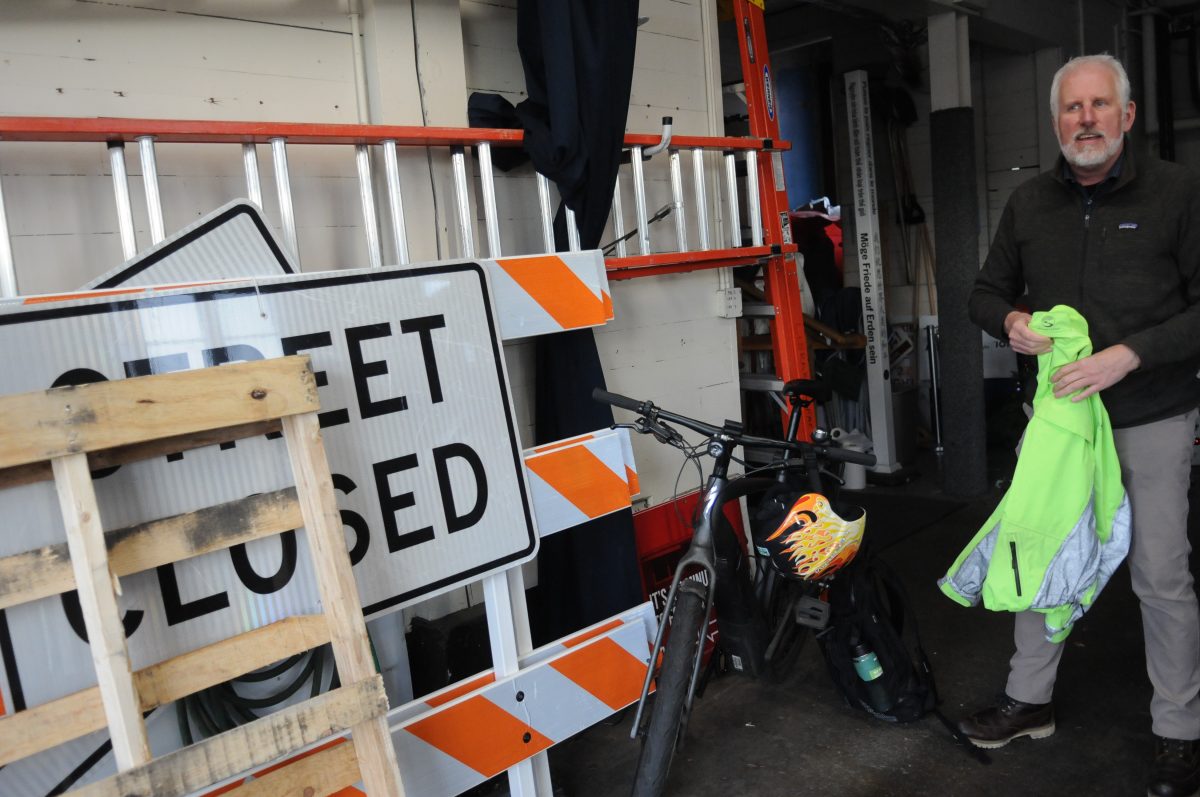

What’s your relationship to cycling?
“Every time there’s a transportation conversation, I’m saying, ‘Look, it’s far cheaper to build another Springwater Corridor than it is to add a lane to I-205.'”
“I grew up biking. I biked to school ever since I was a 7th grader in Western Colorado. I rode a [standard, non-electric] bike when I was a city councilor; but then I stopped when I got too busy as mayor. About five years ago my girlfriend started bicycling from Milwaukie, up through Riverview Cemetery to Lake Oswego. It took her one-and-a-half hours. She said, ‘I can’t do this. It’s too much.’ A friend of hers had an e-bike, so she borrowed it and cut her commute down to 45 minutes — rain, shine, no matter what. That’s faster than a car in some conditions! So I was like, ‘Yep! I’m going to get one.’ Now that I have one, I’m back to riding to about 90 percent of my meetings.”
What do you like about the e-bike?
“It’s astonishing how much faster it is. [In November of last year, Gamba challenged conservative talk radio host Lars Larson to a race between Portland and Milwaukie city halls. Larson never responded.] Plus, I used to show up to meetings sweaty, especially in the summer. Now, as mayor I’ve got a bit higher expectations, so with the e-bike I can just throw my sport coat in a pack and put on a rain jacket and some rain paints. I can walk into a meeting, pull off my rain pants and jacket, put on my sport coat, and I’m ready to go. Then I can sit back and hear everyone else bitch about their terrible drive to the meeting.”
So you want everyone in the room to know you biked there?
“What I’m trying to do is illustrate that you can bike and still show up looking professional. That’s my thing. So I make sure I always walk in with the soaking wet rain jacket on and a helmet. Then I take it off and lay it on a chair, then I put on my sport coat and then I’m in the meeting. Half of the mayors in the region joke with me about it.”
Does the fact that you arrive by bike change the conversation?
“It’s becoming enough of a thing that they won’t sit in the same meeting as me and say things like it’s infeasible to put in bikeways. I don’t know how much affect I’m having personally, but Clackamas County went from downgrading the proposed bike/ped bridge across the Willamette between Oak Grove and Lake Oswego — they downgraded it to a level where it wouldn’t receive funding even though it got the most supportive comments from the public by orders of magnitude — but just recently they not only upgraded it but they supported a grant to study the project and the one Republican on the [Clackamas County] commission has become one of its new champions. That’s a major shift in just three years.
So yes, I think it’s shifting. I took a whole bunch of people from JPACT and MPAC [Metro transportation advisory committees] on a ride when the e-bike show was in town a few years ago. 25 of them showed up. And one Metro councilor went out and bought an e-bike after that. It was Kathryn Harrington, who was just elected Chair of Washington County. Mayor Jeff Dalin of Cornelius was on the ride too. He rides a motorcycle typically, and he had a blast! He smiled and laughed the whole time. It was a real eye-opener for a lot them.”
What have you done to make changes on the ground in your own backyard here in Milwaukie?
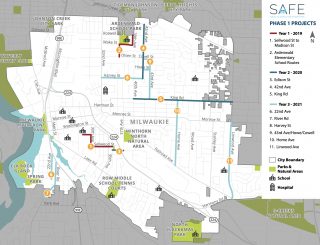
(City of Milwaukie)
“SAFE – Safe Access for Everyone, is a planning process I started as city councilor after I heard parents from Linwood School testify before the planning commission. They said, ‘Our kids live five blocks from the school and they can’t walk there safely.’ They were really passionate about it. So I met with them to learn more. Then I went to a budget committee meeting and said we need to start building sidewalks in the neighborhoods. At the time, we only had a handful outside of downtown. They said, ‘We should study that.’ Well, it turned out the city had already done a study 10 years ago and found it would cost $30 million. And the councilors at the time were like, ‘Oh, we could never do that.’ So the plan just sat on the shelf. That next fall elections were coming up, so I went out and recruited two women to run against two of the councilors who were up for election. One of the women was Karin Power [currently an Oregon House Representative], the other was Lisa Batey. They both won. Beat them badly. I was done with those guys. They weren’t doing the things we should have been doing for our city.
The next step was to overhaul PSAC, our Public Safety Advisory Committee. Theoretically, is was in charge of public safety, which includes transportation; but they were really just a cheerleading squad for the police. So I slowly started replacing the members with young parents who were advocates for active transportation. Once we reached a critical mass on that, the Council had made the decision to do something about the issue, so I said, let’s assign PSAC to do a planning process. And that caused the rest of the older PSAC members to quit, and I was able to fill those seats with more young parents.
By the time the SAFE plan came back to City Council for approval in 2014, the whole city was behind it. Everyone was excited about it. Then we had to figure out how to pay for it. We don’t have a lot of growth in Milwaukie. We’re not getting fresh tax dollars. So this city gets poorer every year. It’s about $51 million to do all the SAFE projects. We knew we couldn’t raise $51 million, so we did some math: $4.85 per month on everybody’s water bill (with an exception for low-income people and a different rate for businesses) and we went out and bonded against the first phase of projects. Council passed it. And when that first water bill came out we only got about five or six angry phone calls.”
When will these projects get built?
“Some of them already have concrete being laid. The first phase started this last spring.”
Advertisement

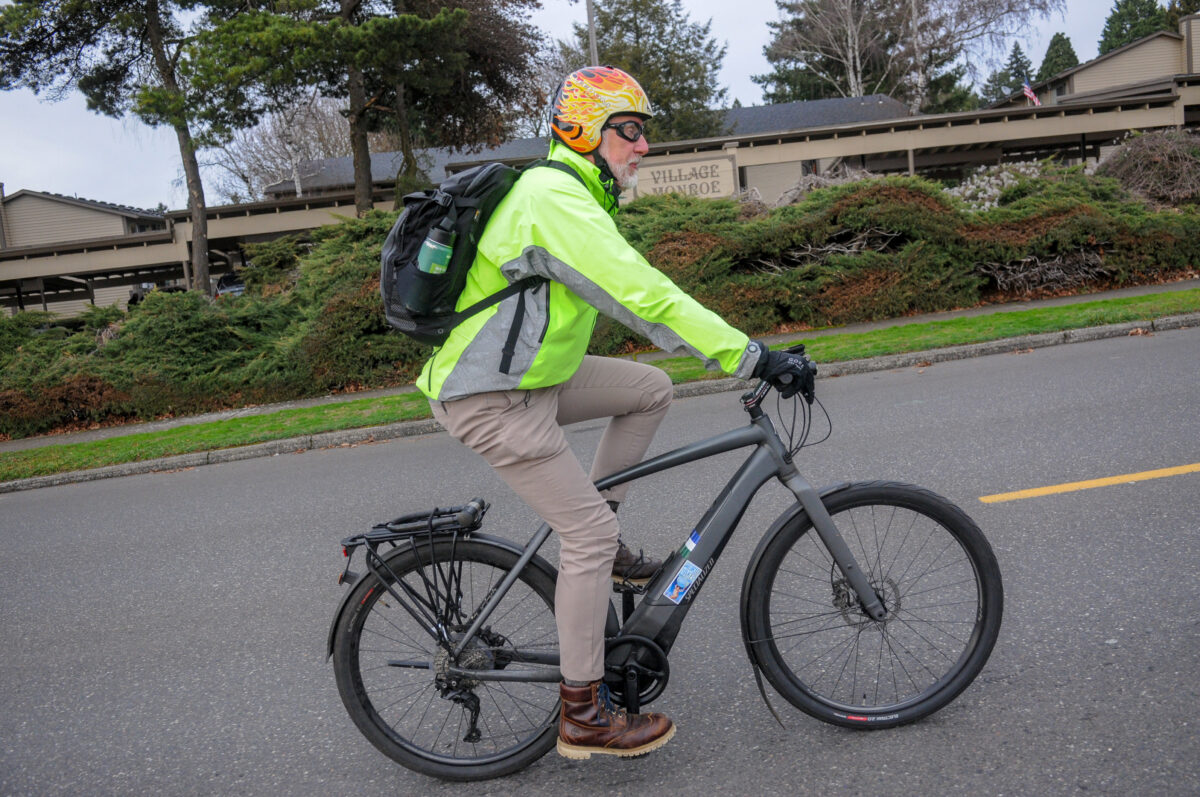
Has Milwaukie adopted Vision Zero?
“I proposed that years ago, and I have one councilor — Lisa Batey — who has this thing about setting goals that can’t be attained. It’s like an embarrassment thing. She believes in all these initiatives though, just not in the proclamations. It was the same with climate. She pushed back on that. I pushed for Milwaukie to be a “Net Zero City” by 2040 and she said, “That’s impossible! We can’t do it!” But it’s an official city goal now because we did a visioning process around it and citizens pushed for it .
And as for Vision Zero, we’re doing all this stuff anyways. And the places that are the worst for Milwaukie as far as deaths and serious injuries are concerned, are where we cross Highway 99 and 224 — which are ODOT roads we have virtually no control over.
When you look at regional maps for deaths and serious injuries, 99E is one of the routes, top to bottom, that’s bad — with the exception of one spot in the middle. Guess where that is? That’s Milwaukie. It’s because we have a lower speed limit through downtown. It makes a huge difference.”
Do you see Milwaukie as a bridge between the reform-minded transportation mindset in Portland and the sometimes anti-Portland, “No Portland creep” mindset in Clackamas County?
“Yes. I do see us as a bridge. I see us as setting an example at Clackamas County. I’m not shy at C4 (Clackamas County Coordinating Committee) meetings. Every time there’s a transportation conversation, I’m saying, ‘Look, it’s far cheaper to build another Springwater Corridor than it is to add a lane to I-205. You guys want to start solving congestion? Make it safer for people to ride their bikes everywhere in this region.’ And I say that over and over and over again. I push really hard.”
How is cycling related to the other issues you’re working on?
“When you’re sitting in that little coffin, driving down the street, you are completely oblivious to the rest of the world.”
“For me, this is all about climate. That’s what drives me. I was a National Geographic photographer. I was seeing climate change happening and I understand what that looks like when it plays out. It’s very clear in my head what this world looks like if we don’t turn this thing around. And what it looks like is a place that’s untenable for human beings — certainly untenable for the society we’ve created. So that’s why I got into politics in the first place. And I understand that single-occupancy, gas-powered vehicles are one of the biggest problems in that realm. The more we can pull people out of those cars it’s better for health, and our community because you run into people and you talk. When you’re sitting in that little coffin, driving down the street, you are completely oblivious to the rest of the world. You don’t know what it smells like, you can’t hear the sounds, there’s no interaction. You are literally moving from your home, into another indoor space, into your office (another indoor space). And I feel like active transportation is better for people in all ways. And bicycling is the most efficient form of transportation humankind has yet developed.”
Have you found a way to say all that without scaring other policymakers away?
“I don’t know. I haven’t discovered a secret for being able to translate to a climate denier why this makes sense. Although I have had conversations with some of those people who are not total whack-jobs, ones who are just to the side of that, and said, ‘Look, if we pull 10,000 people out of their cars and onto bikes, that’s 10,000 more spaces on the freeway for you.’ And they can hear that. They have a hard time imagining that there’s 10,000 people that want to ride their bikes. So I think that’s part of the thing we need to continue as a movement: Make it really clear that there are a lot of people that want to ride, that there are a lot of people that would love to ride their bikes if they felt like it was safe, if they felt like they could get there without getting soaked or being sweaty or smelly or taking too long, or all those things. It’s a learning process.”
You’ve been a leader here for nearly four years now. What’s the status of cycling in Milwaukie?
“It’s picking up. We had a developer having a meeting standing outside city hall a few months ago and he asked one of our staff, ‘How bike friendly is Milwaukie?’ And coincidentally I was riding up into city hall to park my bike. And she goes, ‘That’s the mayor.’
I see more and more cycling in Milwaukie and we haven’t even done the things we have planned yet. None of these greenways [on the SAFE map] are built. I see cyclists all the time now. When I first moved here 16 years ago, I was it… well me, and Matt Menely [local bike advocate] and a handful of other crazies.”
What have you built for cycling here in the last 3-4 years?
“The new path on 17th Avenue is the only thing that’s been built. Monroe has sharrows [and is slated for much bigger things as the city’s primary greenway]. We’re putting in a diverter at Linwood to bring the traffic level down so it’s a reasonable greenway.”
Speaking of that 17th Avenue path. What happened with those terrible stop signs? [When the path was built there were many stop signs directing bicycle riders to stop at private residential driveways.]
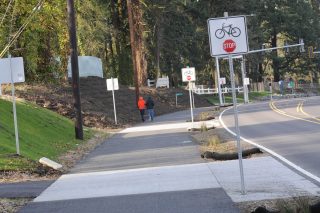
“We were a week away from me going out there and pulling them down myself! The ODOT engineer is in control of that aspect of any new bike infrastructure they are in charge of. So whenever you have that type of grant money – unless you’re Portland or Clackamas County or Eugene, places that have a federally qualified engineer — you have to work with ODOT. And the ODOT guy who’s in charge of the signage, his attitude is every place you cross anything where a car can drive, you need a stop sign. I told my engineer: ‘Here’s what’s going to happen: We’re going to have an opening day ride and I’m going to lead that ride, and I’m going to stop at every single one of those stop signs. Then I’m going to explain to everyone, ‘Yep, that’s ODOT.” And a couple weeks later, the stop signs came down. It still frustrates me, even when the path crosses streets [two stop signs remain] because, if you think about it, if it was a bike lane, those cars would be required to stop for 17th Avenue traffic, which includes bicycles. So my personal attitude is, the bicyclists should have free-flow, just like the cars on 17th do.
Idaho has that rolling stop thing. I think Oregon needs to get on the stick. Now that we have a supermajority [in the Oregon Legislature], it might be the time to go after some of this bullshit that bicyclists have to deal with.”
In 2017 the legislature passed a $5.3 billion transportation package that included a bunch of highway expansions that felt like giveaways to Republicans so Democrats could get relatively small investments for other things likes transit and safe routes to school. The 2020 Metro transportation bond is going to happen and I’m worried we’re following that same path. How do you feel about that? When this bond comes up, will you still be at the table talking strongly about bicycling investments?
“Absolutely. Where I struggle — and I do struggle — is when they talk about widening I-205, I’m like, ‘Great, and we build that new lane and guess what, demand responds. It fills back up!’ So instead of having a traffic jam for six miles, you have a traffic jam from the Oregon border down past Wilsonville. It’s induced demand. So I struggle with that because I understand people. They see all the traffic as the problem and it’s really hard to convince them that, so did Denver and so did Los Angeles and so did Dallas and so did Atlanta — and they kept building more and more and more lanes and they all filled up. That’s not the answer. I’m finally getting other mayors to hear that. [Wilsonville Mayor] Tim Knapp has been arguing that we’ve got to be building mass transit if we’re building a lane on I-205, it’s got to be set up to have buses on shoulders, those kinds of things. So it’s starting to shift. People are starting to hear it.”
If you had a vote, would you have voted for the I-205 widening project?
“It’s really hard to point fingers and say, ‘They failed’. But they did.”
“Well [large exhale]… I think… I mean… I’m not down there, so it’s really hard to point fingers and say, ‘They failed’. But they did. And the politics is about the fear of backlash. Here’s what all of those people [electeds in Salem] fear: They go, ‘OK, If we do all the things that you’re saying we should do, and we piss off 70 percent of the populace, guess what you’re going to have? You’re going to have a Republican legislature again.’ And I’m like, ‘Well, what we’re getting on on the ground is not much different than what we’d be getting if we had a Republican legislature.’ Then they kind of cringe, and they hear what I’m saying. It’ll be interesting to see what happens with this supermajority. With people like [Senator] Shemia [Fagan] and [Representative] Rachel [Prusak]. They’re real go-getters.”
We still have these three freeway widening projects on the books. What do you think people should do about them? Should we fight? Should we just move on? Will you be part of the opposition?
“I would definitely weigh in… [long silence]… You always have to step in and look at the big picture. When you recognize that there are a 1,000 people a week moving into the region. When you really wrap your head around that and imagine how much worse the congestion is going to get. To some degree, we have to do everything. But my argument is this: We can get a whole lot more people out of cars and onto bikes with “X” amount of money than you can change the dynamic of a freeway with that same amount of money. Pound for pound, dollar for dollar, you’re going to do much better spending on bike infrastructure. And that’s the drum I’m going to continue to beat.
I’m not necessarily going to lay myself across Highway 217 and try and stop that project. But I will continue to say we have to be spending equally, at least, on bike/ped. Because that’s how you’re truly going to get a shift in congestion. You are not going to get a shift in congestion by building lanes on highways. Building more lanes doesn’t work.”
Do you think Portland is headed in the right direction?
“I see cities that aren’t green bubbles like Portland doing really huge things. Like Indianapolis [they completed their downtown Cultural Trail in 2013]. I actually think Portland is a little behind the times. We haven’t invested to the level that some of the other cities have invested in our bike infrastructure. And we could. And I’m really hoping — because she’s such a climate hawk — that our new Metro President Lynn Peterson will drive that.”
———
Gamba won a second term as mayor in November (he ran unopposed) and told me he plans to seek higher office someday. When ODOT Director Matt Garrett resigned last month, Gamba posted on Twitter that he hopes Garrett’s replacement is a “climate hawk”. I semi-jokingly asked Gamba if he’d be interested in the ODOT job. “Wow,” he replied. “I hadn’t really considered that, I’m kind of on a different path. Hmmmm.”
— Jonathan Maus: (503) 706-8804, @jonathan_maus on Twitter and jonathan@bikeportland.org
Never miss a story. Sign-up for the daily BP Headlines email.
BikePortland needs your support.

